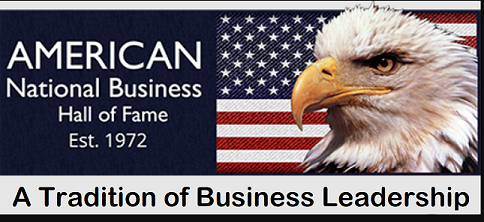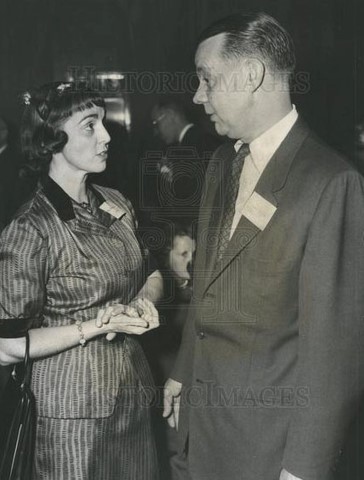Jewel Food-store Chain
Click for PDF version of Franklin Lunding -- Jewel Food-store Chain -- Biography
Introduction
Franklin Lunding
Franklin Lunding was born in Hope, North Dakota on February 26, 1906. Lunding graduated from the University of North Dakota in 1926 and "worked in the research department of the U.S. Chamber of Commerce in 1927-28" (p. 69) while attending George Washington University Law School. After graduating from law school in 1929, he "went to work as an attorney for the Federal Trade Commission" (p. 69). He began his career at Jewel when John Hancock hired him as general counsel in 1931.
Frank Skiff originally founded the Jewel Tea Company in 1899. He sold coffee and tea through home delivery service in Chicago. Skiff offered premiums (coupons that could be accumulated and traded for merchandise) "to encourage repeat business" (p. 67), but his company did not begin to grow until his brother-in-law, Frank Ross, began offering advanced premiums in exchange for future business. By 1916 the company had "1,645 routes in over 20 states" (p. 68).
The board at Jewel opened retail stores in 1932 when Green River, Wyoming was the first of many communities to pass an ordinance that made door-to-door solicitation of business difficult. Jewel purchased "81 grocery stores owned by the Canadian firm Loblaw" (p. 70) which lost money until 1937 when Lunding was named general counsel and placed in charge of them.
By emphasizing a "high quality meat department" (p. 70) and with an improving economy, Lunding earned a profit with these stores. He convinced his butchers to "become guardians of quality and value for the customer" (p. 70) by selling only "government inspected 'choice' meat" (p. 70). Lunding tried to increase the number of meat departments but the current president, Maurice Karker, objected. Lunding told Karker "If I'm going to fail, I'll fail based on my own judgment. I'm not going to risk my reputation on someone else's judgment" (p.71). Karker then allowed Lunding to open unlimited meat departments.
The success Lunding had with the retail stores, his optimism and enthusiasm about Jewel's ability to "keep the routes going during the war" (p. 71), and his "role in developing a profit sharing plan for company employees" convinced the board members that he "would become Karker's successor" (p. 71). Lunding became president in 1942 when he was 36, and he made sure Jewel allowed others to become chief executives at a young age as well. His successor, George Clements, was 41 and Clements' successor, Don Perkins, was 37.
Lunding adopted and promoted a company philosophy at Jewel, which was published in 1951. The philosophy was so successful that it "had the distinction of being used as a textbook at the Harvard Business School" (p. 77). Lunding referred to this as "THE FIRST ASSISTANT PHILOSOPHY" (p. 75) and described it as follows: "Executive responsibility involves assisting the people down the line to be successful. The boss in any department is the first assistant to those who report to him. You've got to live your life in a worthwhile way. This is a worthwhile philosophy. It doesn't hurt people, it helps them; and after it helps them, it helps the business. . . It's a much harder job to be a first assistant to people working for you than to tell them what to do. It makes doing your job the same thing as trying to bring people along" (p. 75).
In 1950 Jewel's board commissioned an employee survey, which offered strong evidence that employees in general were living by the philosophy" (p. 75). The psychologist that conducted the study expected to see "signs of appreciation and gratitude in the employee toward the company and its beneficial profit-sharing and bonus systems" (p. 75). Instead he saw "the employee proudly referring to his own qualifications and indispensability. Instead of feeling dependent on protective measures and cradle-to-grave security plans of the company, it appears that the employee is convinced that these various plans have been made possible by his own alertness and contributions to the business. . ." (p. 76).
The next three Jewel presidents endorsed Lunding s philosophy. In a 1978 interview with Harvard Business Review, Clements stated: "Lunding was the one that gave me, gave the others, the philosophy by which to live" (p. 78).
Lunding "remained an active force in the company into the 1970s" (p. 79), and between 1950 and 1984 Jewel grew to one of "the 9 largest American food chains" (p. 79). In 1984 after Jewel refused a merger offer, L. S. Skaggs purchased control of Jewel "with an unsolicited $1.15 billion tender offer. Christopherson was chairman of the board and chief executive officer at the time and decided to retire after the takeover. . . With his departure the Lunding-Clements-Perkins-Christopherson era came to an end" (p. 85).
*Copyright 2002. The American National Business Hall of Fame. All rights reserved. No portion of ANBHF may be duplicated, redistributed or manipulated without the expressed permission of the ANBHF.
This article was written by Dr. Richard Hattwick.
Copyright 2001 American National Business Hall of Fame. All Rights Reserved.
ANBHF Laureates
Our laureates and fellows exemplify the American tradition of business leadership. The ANBHF has published the biographies of our laureates and fellows.
Some are currently available online and more are added each month.

